Life on the Run (7 page)
Authors: Stan Eldon
Tags: #Running, #long distance, #cross-country, #athletics, #international races, #police, #constable, #half marathon, #Disability Sport, #autobiography, #memoirs, #biography, #life story

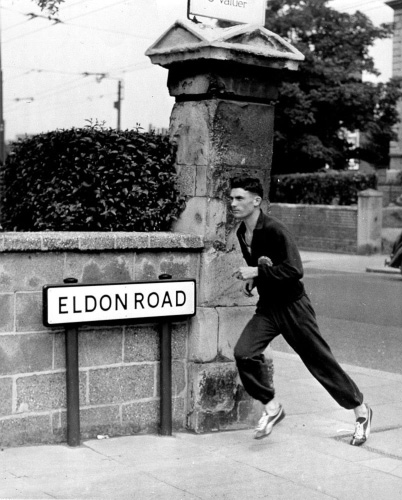
Running home to Eldon Road, Reading
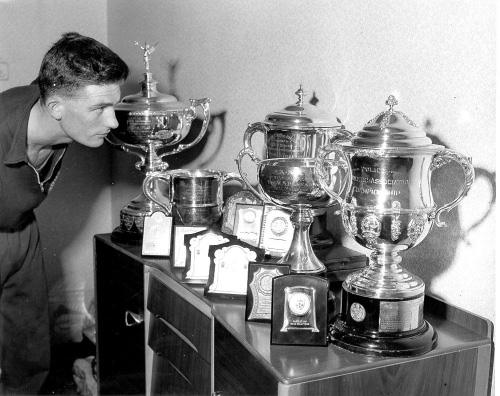
An abundance of police trophies and others
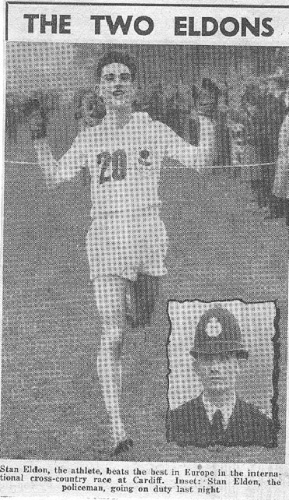
Duty follows major win
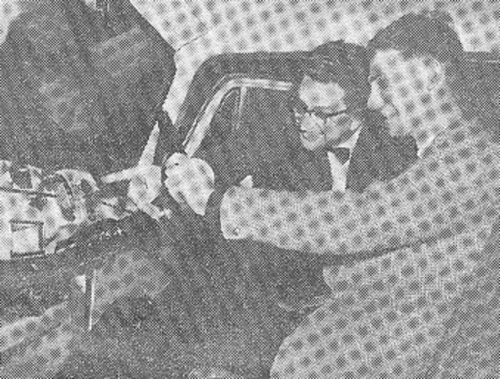
One of my driving lessons with BSM
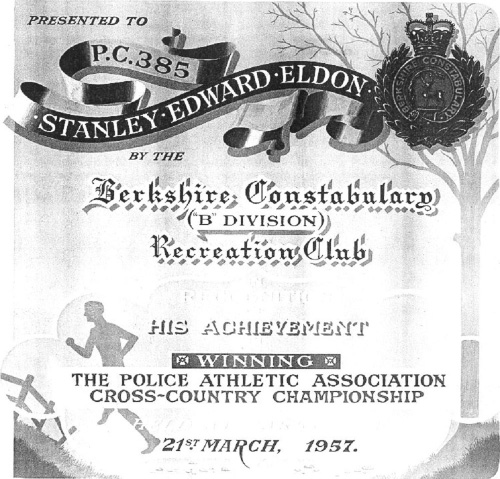
The special certificate presented by police colleagues at Wokingham
Chapter Six: The Running Really Takes Off
The year of 1957 started with an abandoned County Championship at Reading on 5
th
January; but the year did start off with my winning the Berkshire Cross-Country, with a time of 47:34 for the nine miles in the rearranged race the following week. This was followed by the Inter Counties at Rugby, where I got away to a very fast start but faded badly between three and six miles, before coming again at the finish to come in twenty-ninth in 39:17.
I then started my usual increase in mileage, and in the week ending 26
th
January I ran seventy-five miles, with a win on the Saturday in a club cross-country match. I won, but I actually finished and dead-heated with a club colleague, and treated the race as a training run.
The following week my training was down to one of eight miles on the Saturday as I had flu, and it must have been pretty bad because I actually had two days in bed. My diary note on the day I got back to training says “Marion did about two miles”; this must have been a historic moment, I do not recall her running very often.
The following week I missed running on the Sunday, probably due to a quick turn round of my shift. If I had worked on Saturday night and finished at 6 a.m., I was probably back on duty at 2 p.m., so there was not much time to train. On the Monday I got cracking again with a fifteen mile run, and followed this up on Tuesday with another fifteen miles, but with some fast running over one mile to four miles. The next day it was up to sixteen miles, made up of five fast stages of about two miles with slight rest in between. On Thursday I had two training runs, with fourteen miles in the morning, which included 4 Ã 1.5 - 3 miles, and in the afternoon six miles with lots of short fast sprints up to 300 yards at a time. On Friday I did just twelve miles, made up of 3 Ã 2 miles fast, with slow running in between, and on the Saturday I had a 5.5 mile race which I won, but training as well on road and country. The total in the six days, ninety-two miles.
The following week I had to prepare for the Southern Counties Junior champs at the end of the week. Sunday was a rest day (changing shifts again), followed by twelve miles on Monday with 6 Ã 1 mile fast. On Tuesday I did sixteen miles with two training sessions. The first one in the morning was progressive training, four miles, two miles, one mile and 880 yards, all fast and flat out and obviously getting faster as the distance got shorter. This was followed by four miles of short fast bursts in the evening. The following day, Wednesday, I had two sessions again with a total of fifteen miles. This was made up of eleven miles in the afternoon, that consisted of a fast three miles, and 2 Ã 2 miles fast and then a short four miles in the evening. On Thursday I did ten miles with a two mile, followed by 2 Ã 1 mile and then 20 Ã 100 yards fast running. Friday was a rest day, and then it was the Southern on Saturday, where I finished second in 32:18 for the six mile course. The total for the week was only sixty-three miles which was normal on a big race week.
The following week it was back up to eighty-three miles, running every day with a mixture of fast and steady running and culminating in my winning the Berkshire Junior Cross-Country Championship. Another week followed of about eighty miles of running, which included another club win where I ran with a club colleague and treated the run as training. It was then the week of the National Junior Championships. My mixed week of training of sixty miles helped me to achieve a fourth place for the 6 miles 700 yards course with a time of 35:58. The following week I did seventy-five miles of mixed training as I prepared for my final race of the 1957 Cross-Country Season, the Police National Cross-Country Race at Harrogate. The police were always good to me, and sent a sergeant to Harrogate with me as a âminder'. I had a very light week of training before this of only forty miles, and won the 6.5 mile race in 37:37. My win robbed a policeman, DC Pemble from Kent Constabulary, from winning his fifth title.
The final week of March saw me preparing for the start of the track season and the road races that would fill the gap between the seasons. I only did fifty-three miles, but it was quality fast running over shorter distances, and at the end of the week I ran for Windsor and Eton AC in the Thames Valley Harriers Road Relay at Cranford. I set a new record for the 4 miles 1,500 yards single lap of 22:31.
The next week it was really down to track training and a total of sixty miles, made up as follows. A steady run on Sunday of five miles, then on Monday eleven miles, which included eight miles on the road and three miles on grass, with fast stretches of one to three miles. On the Tuesday I did ten miles on grass, which included one mile in 4:37, half a mile in 2:17, 440 yards in 67 seconds and then 12 Ã 220 yards in between 29 and 33 seconds, all with about one mile of jogging in between each fast element.
Then came another of my favourite races, the Uxbridge Road Relay. The race started outside the Uxbridge Swimming Pool, and each of the four runners ran two laps totalling 5 miles 1,000 yards, and I set the fastest time with 27 minutes. The laps included running up the A40 twice. Imagine trying to do that today.
My next race was on Easter Monday at Maidenhead, where I finished second in 52.11, worth about 50 minutes for ten miles on the two-lap course, that ran out from Maidenhead to Cookham and back. Every Easter Monday, for a number of years, Marion and myself would have tea at Cookham with my friend and advisor Stan Jones. It was always a pleasure, as also there every year was Sam Ferris, the Olympic Marathon Silver Medallist from 1932. Sam was always at the âTen' to write up on it for
Athletics Weekly,
and it was sad over the years to see this once great marathon runner struck down with Parkinson's disease.
At the end of the week, I ran in the Southern Counties six mile at the White City and finished third in 28:53. I will always remember this race as my girlfriend Marion was in the stands, and on the last lap, just as I was about to strike for home on the back straight, I tripped over someone's legs and fell sprawling onto the track. I felt inclined to give up at that stage, but a voice screamed at me from the stands, “Get up you fool, you can still win.” I didn't, but it nearly worked.
My training continued at the fifty to sixty miles a week mark, and I was now getting used to running twice a day on two or three days a week. The training was mixed with plenty of 220, 440 and 880 yard fast running with up to a lap of recovery. I also started on my âprogressive training' as I called it. Running a fairly fast 3/4 mile in 3:24, and then 2 Ã 880 yards in 2:14 and finishing with 440 yards in 63 seconds. I kept up this training but adding much more to it over the next three years.
Compared with the next three years, my number of races in this season was pretty small and well spread.
In the middle of May, I ran in a Invitation 3,000 metres at Thurrock. The result third in 8:38.2. The following week I had a double win in the Berkshire Championships at Reading, winning the one mile in 4:22.2 and the three miles in 14:12.6.
My running continued on the up, and on one evening in May, in an inter club match at Maidenhead, I had three races in about ninety minutes. I won the mile in 4:19.2, then the 880 yards in 1:56.6 (my best ever for the distance), and finally I won the two miles in 9:13. All this was done on a five laps to the mile grass track that was like a switchback. About ten days later I took second place in the Inter County three miles at the White City in 13:47.8. I followed this at the same meeting, with fifth place in the six miles in 28:46.
A few days later, I was in Glasgow for the Glasgow Police Sports. This was a very major meeting in those far-off days. It had a big budget, good prizes, and it attracted some of the best athletes in the world. I took second place in the three miles in 13:49.2.
I then won the Southern Counties three miles at Hurlingham in 13:49. It was then onto the White City again for the AAA Championships. As always the six miles was on the Friday evening, and I took second place in 28:50.8. I followed this up with third place in the three miles in 13:52.2 on the Saturday.
The Police Athletic Championships were held at Iffley Road, Oxford in July, and I won both the three miles in 14:16, and the one mile in 4:9.3. My memory of that meeting was that when I walked into the changing rooms at Iffley Road, I met a new recruit to the police service. It was such a shock as it was a pretty good 400 metre runner who had been a lieutenant in the Royal Military Police at Bulford with me. In his Army days he had been a bit more than just an ordinary bastard, and I thought he was destined for a long Army career. I think it was my running there that got me onto police posters in Oxfordshire, no not as a âWanted Man' but as a recruitment campaign.
Later the same month, I won an invitation three miles in Dublin in 14:4 around the famous rugby ground of Lansdowne Road. It was only a marked out grass track, but there was a huge crowd and the stadium was packed. It was here that I met the Olympic three mile gold medal winner of 1908, Joe Deacon. The meeting was promoted by Billy Morton, the well-known Irish character who loved his athletics, as a way of raising funds for the new stadium that he had planned for Dublin. He was a great showman, and the meeting was promoted with the message that an Olympic gold medallist would be taking part. That was sort of true as Joe Deacon ran around the track nearly fifty years after his Olympic glory.
My AAA's results earned me my first full international vest against France at the White City. This was a great thrill, but ended in disaster with photographs of me laying prostrate on the grass after the race, and headlines
“The flop by the galloping cop”
and similar. I was not last but third out of four in 30:40.6. I had suffered in the heat, a problem that stayed with me throughout my athletic career; more of that later.
Only four days after my failure, I bounced back with a win in the three miles for the Combined Services against the AAA and Combined Universities. The winning time was 13:55.
In September I was selected for my first full overseas vest, and I was off with the British team to run in Hanover, Germany, and Warsaw in Poland, and in between I had a trip to Finland to run in a 3,000 metres race, where I finished sixth in 8:27.4. It was a very memorable and enjoyable trip, even if my performances were not quite what I had hoped for. I well remember some of the characters who were on that trip. Of course there was the famous Gordon Pirie who I suppose I had a love/hate relationship with, and there was big George Knight from Essex Beagles, who was a very fine 10,000 metre runner, and a vegetarian. In Poland I ran the 10,000 metres, and in Germany the 5,000 metres, both were not good runs and I was last of four in both races.
Lads always lark about, and while at the school in Germany where we were staying, I went down to have a shower which was on the ground floor. After the shower I was running back upstairs with just a towel around me, and was confronted by the women's team manager, and as I was just in front of her on the stairs, me going up and her coming down, someone pulled my towel away leaving me starkers in front of someone who was the doyen of women's athletics for many years.
In between the two full internationals, a small team of about fifteen went to Copenhagen for an invitation meeting. We flew from Hanover to the Danish capital in one of the two Elizabethan aircraft. One of the athletic team officials, Bob Adams, was also Deputy Chairman of British European Airways at the time, and he accompanied us on this trip. This enabled me to do something that was a once in a lifetime experience. At the time BEA were looking for pilots; the stock they had carried over from the war were slowly retiring, and the airline was getting desperate for some new blood. As we were getting closer to Denmark, Adams suggested I might like to fly the plane! He took me up to meet the captain and I was put in the seat and told what to do. I remember how difficult it was to control the level flight and keep the wings level and watch all the instrumentation, even though it was a lot less than in a modern aircraft. A message came up to the cockpit from Derek Ibbotson, who complained of feeling sick because of the movement of the aircraft, I think he was only kidding. I did fly for some way until we were in sight of the runway, then the professionals took over. I did not get offered a job, but it was a very exciting experience, and I still have the letter that I sent home to Marion telling her all about it.
The visit to Warsaw was a great experience for a number of reasons. It was my first visit to an âIron Curtain' country, and we arrived within days of some student riots in the city, and the bullet damage was still clearly visible on the damaged buildings. There was also a great black market in the Polish currency, the zloty. The official rate of exchange was sixty to the pound, but because there was such a demand for sterling, up to five times that could be fetched in an exchange on the street. I did not take advantage of this, but I worked out that for about £50 you could buy an excellent grand piano, but how could I get it on the plane home! The visit also showed how well off we were compared to the population of Poland. The food was terrible and it was fortunate that one of the two aircraft we had flown out on had carried a hold full of Lucozade. The water was so bad we were advised not to use it for anything, and we even cleaned our teeth with the amber drink.
Soon after I arrived at the hotel, I had just settled into my room when I received a phone call, very unusual in any circumstances at that time, but this was even more unusual. It was a young lady and she did not say much, but that she would like to come up to my room. I wondered what temptation was going to be put in the way of this young man just weeks away from his wedding. The visit was of a much more serious nature. The first thing she did on entering the room, before she said anything, was to look under the bed, along the skirting and into the air vent. After she had satisfied herself that everything was OK, she explained that she thought the room might be âbugged'. She wanted an interview with me for a student underground newspaper, and had picked me out because I was young and a policeman in England. We had a long conversation about life in England, my life, and in particular about young people.